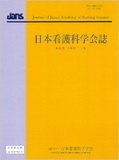Japanese
English
- 販売していません
- Abstract 文献概要
- 参考文献 Reference
要旨
目的:非糖尿病性保存期CKD患者の病気認知の特徴より,病気認知タイプを分類化すること.
方法:非糖尿病性保存期CKD患者に対するインタビュー調査により明らかにした病気認知の特徴を,ヘルスビリーフモデルの構成要素をもとに事例−コードマトリックスにまとめ演繹的に分析した.
結果・結論:健康行動に『利益感』を認める事例と認めない事例に分類でき,さらに『障害感』『行動』より,利益感あり群は3タイプ(A〜Cタイプ),利益感なし群は2タイプ(D・Eタイプ)に分類した.Aタイプは「自己管理を生活に取り入れ堅実に実行できるタイプ」,Bタイプは「揺らぎながらも自己管理行動を生活に取り入れ実行するタイプ」,Cタイプは「自己管理への不本意さをもちながらも指示に服従するタイプ」,Dタイプは「病気が納得できず自己管理を実行するが,虚無感があるタイプ」,Eタイプは「病識がなく十分に自己管理が行えていないタイプ」であった.患者タイプに応じた教育内容や教育方法を検討する必要性が示唆された.
Purpose: This study aimed to classify types of disease perceptions of patients with non-diabetic chronic kidney disease (CKD) in the conservative phase—based on the characteristics of the patient disease perceptions.
Methods: An interview survey was conducted for non-diabetic CKD patients in the conservative phase to understand the characteristics of the patient disease perceptions. The interview data were deductively analyzed by summarizing the characteristics in a case-code matrix based on the components of the Health Belief Model.
Results and Conclusions: Patient health behaviors were classified into groups with or without the patient “perceived benefits” of adherence to behavioral advice. Further, focusing on “perceived barriers” and “behaviors”, the group “perceived benefits” were classified into three types (A to C), and those without such feelings into two types (D and E). Type A patients “consistently adopt and practice self-management in their life,” type B “adopt and practice self-management in their life with unstable feelings,” type C “follow instructions despite unwillingness to self-manage,” type D “practiced self-management although they cannot accept their illness and have a sense of emptiness,” and type E “have no awareness of illness and cannot fully practice self-management.” The findings suggest the necessity to consider the contents and methods of educational support depending on the patient type.
Copyright © 2022, Japan Academy of Nursing Science. All rights reserved.


